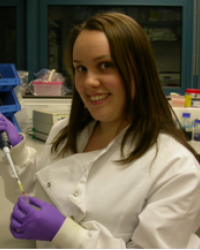Florence Pethick

Project: Comparative genomic analysis of Corynebacterium pseudotuberculosis
Type: PHD
Institution: Moredun Research Institution
Report: Comparative genomic analysis of Corynebacterium pseudotuberculosis
Caseous lymphadenitis (CLA) is a chronic disease of sheep and goats, caused by infection with the bacterium Corynebacterium pseudotuberculosis, and is characterised by the formation of pus-filled abscesses in the lymph nodes and other tissues. Despite being a problem in many other countries for over a century, CLA was only introduced into the United Kingdom approximately 20 years ago and was originally considered a disease that affected only the terminal sire breeds. Subsequently however, CLA has become endemic within the national flock, and can now be found the length and breadth of the UK.
The disease can be responsible for considerable economic loss to the sheep and goat industries in affected areas. Some of the costs associated with CLA are carcass condemnation, reduced sales of breeding stock, increased rates of mortality and reduced wool production.Producers are increasingly concerned about CLA, yet methods of combating the disease are limited; an example of this is the importation and use of foreign vaccines which are not wholly-effective against the disease in this country.
Consequently, the objective of this studentship is to identify and characterise novel proteins produced by this organism that might form the next generation of diagnostic reagents. The project aims to conduct an analysis of the Corynebacterium pseudotuberculosis genome sequence, with a view to identifying potential diagnostic antigens. Subsequent work will determine conservation of these antigen targets among a multinational panel of C. pseudotuberculosis isolates. In addition, these proteins will be screened using immune sera from sheep with CLA to assess their usefulness as diagnostic reagents.
Significantly, this project was made possible as a result of the availability of the near-complete genome sequence of C. pseudotuberculosis, provided through a QMS-funded sequencing project previously conducted at Moredun.
